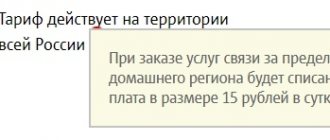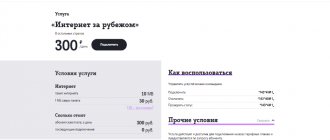The telecommunications operator Megafon is in demand among subscribers throughout Russia, offering balanced tariffs and options at affordable prices. Like other competing organizations, this operator divides service areas into corresponding regions, which makes the question “Megafon roaming in Russia canceled or not in 2021?” relevant.
The reason for the cancellation is the monopoly policy of such companies that artificially increase the prices of intranet communication. In this material we:
- consider a detailed description of the current situation;
- Let us briefly examine the draft law;
- Let's find out how this will affect the final customer service.
How roaming works
Roaming is a service for subscribers, when connected they can use mobile communications outside the service area of their mobile operator. In simple terms, roaming allows users who travel abroad to make and receive calls using a guest network. This is the operating principle of international roaming.
Until a certain time, national roaming existed across the territory of the Russian Federation. There are 3 types of roaming in Russia:
| Type of roaming | Characteristic |
| National roaming | Roaming was activated in those regions where the main operator does not operate. That is, in another region you are forced to use the guest network of a competing operator. It is clear that you will have to pay extra for such services. |
| Intranet roaming | Roaming operates in the user-selected network in different regions of the Russian Federation. But you will have to pay more to use the services of the same operator in another region. |
| Roaming in Crimea | Since other operators operate in Crimea, residents of the Russian Federation who visit Crimea use the services of the guest network. |
The Federal Antimonopoly Service of the Russian Federation advocated the abolition of intranet roaming, since there is no point in paying more for the services of your own operator.
How are tariffs for Megafon communication services carried out?
As we indicated earlier, telecommunications operators divide the territory of Russia into certain service areas. This allows:
- analyze existing competitors;
- identify features of the installation and further equipment;
- draw up and release into mass use a balanced tariff line.
In order to increase benefits, “home” and “guest” regions were allocated, which allows you to change the tariffication of an outgoing call. When communicating in your home region, you can receive a number of benefits and discounts on services. In the guest region, the situation is different: full-fledged “intrastate roaming” operates here, which contributes to additional overpayments for frequent calls in this direction.
Canceling Megafon roaming is a pressing issue that has been under consideration for several years. This year, the problem should be successfully resolved, but customers need to further familiarize themselves with the draft law and the possible risks for potential and new subscribers. We will look at this information in the next section.
Cancellation of roaming, the role of FAS
The Federal Antimonopoly Service (FAS) has been solving the problem of abolishing intranet roaming for several years. As a result, it was only in March 2021 that roaming within one network within the country was finally abolished. The FAS decision most affected the largest mobile operators in the Russian Federation. Their number of clients makes up the vast majority of Russian residents and is distributed as follows:
- MTS has more than 105 million subscribers;
- Megafon has about 70-80 million clients;
- Beeline has more than 56 million subscribers;
- Tele2 has approximately 40 million customers.
Beeline and Tele2 were the first to completely abandon roaming within the country. MTS and Megafon started canceling with the most popular tariffs, then roaming was turned off for less common plans. By September 1, 2021, the FAS demanded that the Big Four operators completely cancel intranet roaming.
The European Union has already dealt with a similar situation. Residents of European countries can use the home tariff throughout the EU. But to implement such a large-scale project, long preparations were carried out. It took several years, since there are several large companies in each country. For Russia, where there are only 4 largest operators, a shorter time frame was needed.
European experience
The European Union has already finally said goodbye to internal roaming. It’s not just the regions, but all 28 countries that have equalized tariffs within the union. But telecom operators, unlike Russian ones, were given 2 years to prepare. Roaming has been preserved only for foreigners coming to the European Union.
When traveling around Europe within the same network, subscribers do not pay additional money!
Russia is heading towards this, or rather, has almost already arrived. Since in the EU so many operators were able to agree among themselves, in the case of Russia, which has only 4 largest operators, this procedure should be much simpler.
Operators' reaction to the cancellation of roaming
The abolition of roaming within one network dragged on for several years due to the fact that operators found new arguments to maintain tariffs at the same level. There is common sense in increased prices for mobile communication services in different regions. Competing operators had to pay extra for their infrastructure in order to continue providing connectivity to their customers. But the antimonopoly service carried out calculations and consistently proved that there are no compelling reasons for maintaining such high tariffs.
After this, the Big Four operators did not provide any information about the cancellation of roaming. But subscribers have new concerns that operators will find ways to compensate for losses. On-network roaming brought in about 3% of profit; in total, for the country’s 4 main operators this income amounted to approximately 35 billion rubles. In fact, operators began to prepare for the loss of such income six months before the actual abolition of roaming.
At the beginning of 2021, MTS, Megafon, Beeline and Tele2 raised the cost of their tariffs. Due to this, the companies plan to compensate for losses. In the future, we should also expect an increase in the cost of mobile communications in Russia. Operators motivate this pricing by the fact that Russian communication services are already among the cheapest in the world.
The State Duma is in touch
In addition, the State Duma recently adopted in the first reading a bill amending the Law “On Communications”, according to which both intranet and national roaming should be prohibited. Communication services, according to this document, when traveling around Russia should be provided at uniform prices.
A CNews source in the telecommunications market says that the decision to cancel fees for incoming calls in intranet roaming was made under pressure from the FAS, and the service planned to announce this in the near future. However, a number of operators, according to the source, decided to be proactive and announce the abolition of fees for incoming calls as their own achievements.
- The best rates for Dedicated dedicated servers on the Market.CNews IT marketplace
Igor Korolev
Share Short link
Is there any benefit for Russian citizens
Only a small percentage of the country's population will actually be able to save money by canceling roaming. Among them are businessmen, workers who are often sent on business trips, travelers and truck drivers. These residents of the country will no longer have to pay for incoming calls. For outgoing calls, you can use a home package with a set number of minutes.
Previously, when connecting to a tariff, you could choose a package with or without trips. Due to the abolition of roaming, these tariff plans have become equal. Now, if you want to travel to another region, telecom services will be priced under the home package.
But this matter was not without paradoxes. Incoming calls will become free, but outgoing calls will be charged according to the tariff only for the region where the subscriber is located. If one family member leaves for another region, then when calling relatives remaining at home, payment is made as for long-distance calls. But spending on long-distance calls will still depend on the tariff plan.
Also, due to the equalization of tariffs, only those who often travel around Russia benefited. All other citizens began to pay more for mobile communications, although they spend most of their time without traveling. Those planning a trip are advised to go to the official website of their mobile operator and look for favorable rates depending on the city. You may also receive an offer from the service company, thanks to which you can save significantly. All current promotions, bonuses and information on packages can be found on the official website of your operator or checked by calling the hotline number. They will be able to provide more detailed advice tailored to your needs.
How will the abolition of regional roaming affect the wallet of various categories of subscribers?
According to experts, only narrow categories of citizens who make up only 7% of our country’s population can sincerely rejoice at the abolition of regional roaming, namely: active businessmen and business travelers, truck drivers, as well as citizens who often travel around the country. For these categories of citizens, nothing will change now: incoming calls will be free, and for outgoing calls you can also use a home package, which involves using a certain number of minutes for communication.
Previously, the terms of the tariff plan implied the choice of certain options, for example:
- Travel tariff;
- Tariff without trips.
Now, in fact, these tariff plans have been equalized.
In this regard, a nuance has emerged: those people who do not travel pay for those who travel around the country!
If the subscriber is connected to an operator whose network operates in the region where he intends to travel, then this subscriber will be able to make calls using his home package (at the prices of his home region).
There are some paradoxes: there are no roaming fees, but there are intercity fees
In their advertising slogans, all major operators in the country promise free incoming calls within the country. What about outgoing? The head of the information and analytical agency Content Review, Sergei Polovnikov, answers this question:
“But, of course, you have to pay for outgoing ones.” How so? Roaming has been cancelled! And can you make calls using your package? Not certainly in that way. This is for local calls only.
Long distance calls are here to stay! For example, if the husband went on a business trip to another city, and the wife stayed at home, then when calling home, the spouse will pay for the connection at the long-distance call rate.
In general, expenses will depend on the subscriber’s “native” tariff, namely, on the optional package of services and additional tariffs.
That is, if within your network (tariff plan) long-distance calls are free, then they will be free. If they cost some money, then the trip will cost you exactly the same amount as in your home region!
Cancellation of national roaming
In parallel with the abolition of intranet roaming, discussions were also held regarding the disabling of national roaming. The bill was submitted to the State Duma for consideration, and after voting they finally came out in favor of abolishing intranet and national roaming.
The law came into force on June 1, 2021. Now operators are prohibited from setting prices for mobile communications that differ from home regions. Companies should also provide free inboxes for their customers. Subscribers will not pay more if they are in a region where their operator does not operate. Find out who has access to free roaming among Tele2 subscribers and Rosgosstrakh clients.
However, international roaming was not prohibited. It will continue to operate at the same rates. Subscribers will remain charged for both outgoing and incoming calls. Roaming also continues to operate in Crimea, since large Russian operators have not yet installed their infrastructure there. The bill did not discuss issues regarding mobile Internet. It continues to act as your operator decides. Find out more about the opportunities and privileges with Raiffeisen Premium.
Raiffeisen Premium Debit Card
| Cost from | 0Р |
| Cashback | No, discounts |
| % on balance | No |
| Withdrawal without % | For free |
| Overdraft | No |
| Delivery | Up to 10 days |
Raiffeisen Premium Direct Card
| Cost from | 0Р |
| Cashback | No, discounts |
| % on balance | No |
| Withdrawal without % | For free |
| Overdraft | No |
| Delivery | Up to 10 days |
Expert opinion on the abolition of Russian roaming
Nikolai Nikiforov, Minister of Telecom and Mass Communications of the Russian Federation, expressed his concern about the unfair equalization of tariff plans: “The group of mobile communications consumers who move around the country is significantly smaller than the group of users who are invariably located in their region. Based on this, a situation may arise in which operators can increase the price level of tariff plans for everyone: including for subscribers who are constantly located in their home region.”
The Ministry of Digital Development, Communications and Mass Communications of the Russian Federation believes that the abolition of roaming will infringe on the rights of those who, in principle, have never used it and did not intend to use it.
Ildar Murtazin, a leading analyst of the mobile communications market, shared the following advice in one of his television interviews: “Before any trip, be it out of town or abroad, you should go to the official website of your operator (or application). It is necessary to specify in a special line the city where the client is going to travel, and the system automatically provides information about the tariff that will correspond to the region. It is also possible that an offer will be made to connect temporary additional services to save the subscriber.” This advice must be followed in order to avoid unnecessary, unexpected expenses while traveling. This manipulation will take no more than 5-10 minutes.
Popular tariffs of the Big Four operators
Among the 4 largest operators in the Russian Federation, the following tariffs are most popular:
| Operator | Tariff name | Monthly payment | Long distance calls |
| MTS | Tariff | 650 rubles | Available, cost 1-1.75 rubles. within the tariff. |
| Megaphone | Turn it on! Communicate | 500 rubles | Available, unlimited calls within the Megafon network within Russia. |
| Beeline | Close people 1 | 500 rubles | Available, included in minutes per package. After exhaustion of minutes 0 rubles. |
| Tele 2 | Everywhere online | 500 rubles | Available, unlimited calls within the Tele2 network. |
Each operator has its own advantages, but long-distance calls are supported at almost all tariffs. For those who travel a lot, some operators offer special, more favorable rates for them.
about the author
Klavdiya Treskova - higher education with qualification “Economist”, with specializations “Economics and Management” and “Computer Technologies” at PSU. She worked in a bank in positions from operator to acting. Head of the Department for servicing private and corporate clients. Every year she successfully passed certifications, education and training in banking services. Total work experience in the bank is more than 15 years. [email protected]
Is this article useful? Not really
Help us find out how much this article helped you. If something is missing or the information is not accurate, please report it below in the comments or write to us by email
What's happening with roaming in Russia
The connection region is no longer called the home region. Local prices for communication services apply locally, but calls to other Russian regions are already considered long-distance. After the subscriber has left for some other region, it automatically becomes his home region, and the connection region is already an intercity area.
For example, a resident of the Moscow region came to Krasnodar. Initially, his calls to numbers in his home region meant Moscow and the region, but while he was in Krasnodar, everything changed. Local calls are charged at the rates of the Krasnodar Territory, and calls to the Moscow region are considered long-distance.
The luckiest people turned out to be those whose tariff plan includes packages of minutes within Russia. These subscribers can travel throughout the country and still call to any destination. The cost of mobile Internet remains unchanged for all mobile operators.
Incoming calls throughout the country remain free. Even residents of the Republic of Crimea and the city of Sevastopol do not pay for them.
Comments: 3
Your comment (question) If you have questions about this article, you can tell us. Our team consists of only experienced experts and specialists with specialized education. We will try to help you in this topic:
Author of the article: Klavdiya Treskova
Consultant, author Popovich Anna
Financial author Olga Pikhotskaya
- Fania
05/26/2021 at 14:54 Does that mean there is no roaming in Sochi? If you call from Adler to Orenburg
Reply ↓ Anna Popovich
05/26/2021 at 16:35Dear Fania, roaming has been canceled within the same network within the country.
Reply ↓
05.23.2021 at 21:27
Roaming in Crimea on MTS is 10 rubles. (On the Internet). Plus 8 r subscriber fee. And that’s 18 rubles a day...
Reply ↓
Tele 2
Tele2 operator's tariff packages do not include roaming services. For example, you can consider the “My Online” package. Within its framework, the subscriber has access to 15 GB of Internet and 500 minutes of calls to any Russian numbers. If the user travels around Russia, then the following prices apply:
- Voice communication and Internet – according to the terms of the connected tariff;
- Calls over the limit are 1.5 rubles per minute in the region of your stay and 2 rubles to other Russian numbers.
It is worth paying attention to the “Classic” tariff package, namely the strange provision of long-distance communication services. In the connection region, the cost of intercity communication is 9 rubles per minute, and for trips around the country it is only 5 rubles. But perhaps the FAS has its own reasons for turning a blind eye to this.
Special conditions for the provision of communication services apply in the Republic of Crimea:
- Outgoing – 3 rubles per minute;
- SMS messages – 3 rubles.
For mobile Internet in Crimea you will have to pay 3 rubles per 1 MB.











